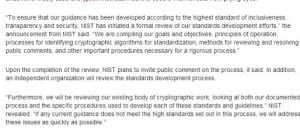The National Institute of Standards and Technology (NIST) announced a formal review of its current standards development process for publishing cryptographic guidance for manufacturers of network access control products and other security programs. The decision was launched shortly after the nationally-published leaks involving the National Security Agency or NSA.
 As posted on the website of SC Magazine, an online publication for security professionals, the NIST said:
As posted on the website of SC Magazine, an online publication for security professionals, the NIST said:
“To ensure that our guidance has been developed according to the highest standard of inclusiveness, transparency and security, NIST has initiated a formal review of our standards development efforts,” the announcement from NIST said. “We are compiling our goals and objectives, principles of operation, processes for identifying cryptographic algorithms for standardization, methods for reviewing and resolving public comments, and other important procedures necessary for a rigorous process.”
An agency under the US Department of Commerce, the NIST is responsible for setting down standards that govern a large number of functions, including overseeing safety in the laboratory and managing timekeeping. With this review, the institute may spur changes in the way they establish requirements for compliance by all involved organizations in the country.
In the long run, the action can be instrumental to assuring computer users of the privacy of the information they share over the Web, as well as boosting security systems for businesses using encryption protocols. The institute reinforced this in their official announcement by saying, “If any current guidance does not meet the high standards set out in this process, we will address these issues as quickly as possible.”
Where vendors of network access protection systems and other security programs are concerned, the possible revamp and resulting recommendations will do much to improve the way they design their products. Respected providers such as Access Smart, LLC will then be able to fortify their features so they can grant optimum security to customers’ information at the point-of-entry.
As such, there will be lesser chances of customer data being hijacked and their networks breached. This improved data protection from trusted developers like Access Smart, LLC can then lead to peace of mind for private citizens, as well as smoother operations and higher returns for businesses interested in logical access products.
(Article Excerpt and Image from NIST Crypto Development Process Undergoing Review, SC Magazine, November 05, 2013)



